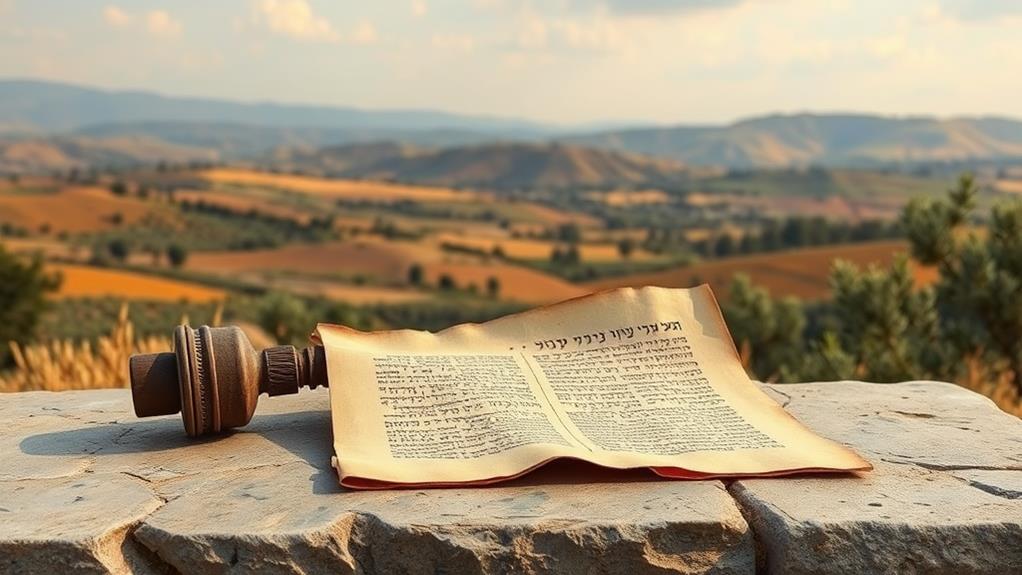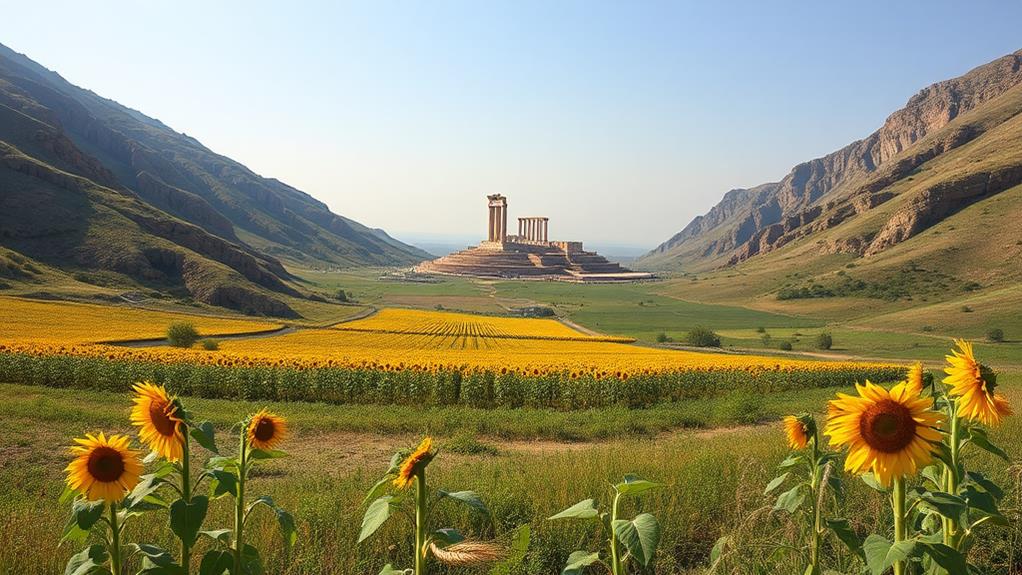Jezreel Name Meaning in the Bible
The name “Jezreel” in the Bible is derived from the Hebrew words “Yizra’el,” meaning “God will sow” or “God plants.” This name symbolizes divine provision, agricultural abundance, spiritual growth, divine judgment, and restoration. Historically, Jezreel was a strategic military center and royal retreat, witnessing key events in Israelite history, including battles and deaths of kings. Prophetically, Jezreel represents divine judgment, punishment, and restoration, as seen in Hosea’s prophecies and its association with Armageddon. Exploring this name further reveals a profound divine message of hope, redemption, and the active role of God in history, inviting a deeper exploration of its rich biblical significance.
Key Takeaways
- Biblical Origin: The name “Jezreel” is derived from “Yizra’el,” meaning “to sow” and “God” or “the All-Powerful,” symbolizing God’s planting or sowing.
- Divine Judgment and Restoration: Jezreel symbolizes divine judgment, punishment, and restoration in Hosea’s prophecies, emphasizing God’s active role in history and spiritual fertility.
- Historical Significance: Jezreel was a royal retreat and strategic military center, witnessing key Israelite events and pivotal battles, reflecting divine provision and reliance on God.
- End Times Significance: The Jezreel Valley is linked to Armageddon in Christian eschatology, symbolizing a spiritual warfare site for a final battle and representing divine judgment and redemption.
- Spiritual Growth and Unity: Jezreel signifies God’s initiative for spiritual growth, judgment on wickedness, and the spread of divine knowledge, symbolizing Israel’s reunification prophecy and new beginnings.
Biblical Origin of Jezreel Name

From a linguistic perspective, the name Jezreel is crafted from “Yizra’el,” comprising “yizra,” denoting to plant, and “el,” which represents God or the All-Powerful.
The cultural explanation of this name mirrors the farming essence of the region recognized as the Valley of Jezreel, a productive plain in Israel where diverse crops are grown. This productive area symbolizes not only physical nourishment but also spiritual development and rejuvenation, aligning with the biblical principles of spiritual growth and harvest.
Beyond its geographical importance, Jezreel is also the name of a person mentioned in the Bible, notably as the son of the prophet Hosea and as a descendant of Judah, emphasizing its symbolic and prophetic implications. The name’s dual application highlights its richness in biblical narrative, embodying themes of divine judgment and restoration.
Consequently, grasping the linguistic roots and cultural explanations of Jezreel offers valuable insight into its varied significance in biblical texts.
Symbolism and Spiritual Meaning
The name Jezreel, derived from “Yizra’el” — a combination of “yizra” (to plant) and “el” (God or the All-Powerful) — not only reflects the agricultural abundance of the Valley of Jezreel but also encapsulates a deeper spiritual symbolism within biblical contexts. This symbolic representation is embedded in the name’s Hebrew roots, emphasizing the divine act of planting or sowing, which conveys God’s sovereignty and proactive role in nurturing and cultivating. Liam’s significance as a guardian resonates with the protective nature of God reflected in the act of planting seeds of faith.
The spiritual significance of Jezreel extends beyond its agricultural connotations. It symbolizes the spreading of God’s knowledge and the planting of His word, reflecting the mission and responsibility bestowed upon the chosen people of Israel. The valley itself has been a stage for numerous pivotal biblical events, including battles and prophetic declarations, underscoring its importance as a place of divine intervention and judgment.
In essence, the name Jezreel embodies a profound spiritual message that underscores God’s involvement in human history and His intent to spiritually cultivate humanity. This understanding emphasizes the critical role of faith and obedience in realizing the divine plan, making Jezreel a name that symbolizes spiritual growth and divine providence.
Historical Significance of Jezreel

Key episodes in Israelite history took place in Jezreel, including Elijah’s confrontation with Ahab and the dramatic death of Jezebel, as detailed in 1 and 2 Kings. The city’s military and agricultural significance were underscored by its role as a royal retreat and staging post for battles in the north and east. Additionally, Jezreel’s fertile farmland and abundance of resources symbolize themes of divine provision and reliance on God, reminiscent of the symbolism of valleys in biblical narratives.
Archaeological excavations at Tel Jezreel have revealed the remains of a rectangular compound, reinforcing its identification as a military or royal center. These findings offer a glimpse into the life and politics of ancient Israel, highlighting the strategic and symbolic importance of Jezreel in biblical history.
The site’s fertile farmland and perennial spring waters further underscored its attractiveness for settlement and military activities.
Biblical Figures Named Jezreel
Biblical figures named Jezreel hold significant importance in understanding the complexities of biblical history and prophetic symbolism. The name Jezreel, meaning “God scatters” or “God sows,” is associated with two distinct individuals in the Bible: a descendant of Judah and the son of the prophet Hosea. This name reflects themes of divine purpose and guidance, mirroring the symbolism of spiritual ascension found in biblical narratives.
- Critical Aspects of Jezreel’s Spiritual Significance:
- The name Jezreel is symbolic of God’s judgment and restoration.
- Jezreel, son of Hosea, represents God’s warning to Israel about imminent punishment.
- The naming of Hosea’s son Jezreel signifies God’s displeasure with the house of Jehu and the prophesied end of the kingdom of Israel.
In the genealogical context, Jezreel, a descendant of Judah, underscores the importance of lineage in biblical narratives.
– Jezreel’s name serves as a reminder of the consequences of disobedience and the importance of heeding God’s warnings.
The biblical references to Jezreel emphasize the spiritual significance of obedience to God and the prophetic nature of the name. Through these figures, the scripture underscores the persistent role of divine judgment and redemption in shaping Israel’s history.
Valley of Jezreel in Scripture

Beyond the individuals bearing the name Jezreel, the geographical location known as the Valley of Jezreel holds significant importance in biblical scripture. The Valley of Jezreel, also referred to as the Valley of Megiddo, is mentioned in various biblical texts, highlighting its spiritual significance and historical context.
Historically, the Valley of Jezreel has been the site of numerous pivotal battles, such as Deborah’s victory over Sisera (Judges 4), Gideon’s triumph over the Midianites and Amalekites (Judges 6-8), and the defeat of King Saul by the Philistines (1 Samuel 31). Additionally, it served as the location where the Assyrians defeated the northern kingdom of Israel in 733 BC, fulfilling Hosea’s prophecy that God would “break the bow of Israel in the valley of Jezreel” (Hosea 1:5).
In Christian eschatology, the Valley of Jezreel is associated with the future Battle of Armageddon, as described in Revelation 16:16-21. This underscores the valley’s enduring spiritual significance, symbolizing God’s intervention and judgment. The valley’s rich historical and spiritual contexts underscore its importance in biblical scripture, emphasizing themes of redemption and divine justice.
Jezreel in Prophetic Prophecy
The name Jezreel holds significant prophetic importance in the Bible, particularly through its direct association with the prophetic acts and messages of Hosea. In Hosea’s prophecies, Jezreel symbolizes the end times and the biblical significance of divine judgment. When Hosea named his first son Jezreel, it was at God’s command, to signify the punishment that would befall the house of Jehu for the bloodshed at Jezreel and the eventual end of the kingdom of the house of Israel.
Key aspects of Jezreel in prophetic prophecy include:
- Punishment for Jehu’s dynasty: God will punish the house of Jehu for the bloodshed of Jezreel, leading to the end of the kingdom of Israel.
- Symbolic representation: The name Jezreel signifies God’s judgment, symbolizing a time of reckoning.
- End times significance: The Valley of Jezreel is associated with the final battle of Armageddon, as mentioned in Revelation 16:16-21.
- Biblical battles: Jezreel was the site of several pivotal battles in biblical history, including Deborah’s victory over Sisera and the defeat of King Josiah.
- Restoration: The prophecy also involves the eventual restoration of Israel and Judah, to be unified under one king.
Jezreel and Armageddon Connection

What is the connection between Jezreel and Armageddon, a topic deeply intertwined with the apocalyptic visions of the Bible? This connection arises from their geographical and prophetic significance.
The Jezreel Valley, situated in northern Israel, has been the location of numerous battles throughout history, including the ancient Battle of Megiddo. This valley, and more specifically Megiddo, is often linked with the end times due to its mention in Revelation 16:16 as the site of Armageddon.
However, this association is based on a misunderstanding. The term “Armageddon” originates from “Har Megiddo,” signifying the “mountain of Megiddo” in Hebrew, but Armageddon does not refer to a valley or a mountain in a literal sense. Instead, it symbolizes a place of spiritual warfare and gathering for the final battle mentioned in Revelation.
This battle is more closely connected to Jerusalem, as indicated by Revelation 11:1-2; 14:20; and 20:9, implying that Jerusalem is the true site of this apocalyptic confrontation. The Jezreel Valley’s historical and symbolic importance thus provides a backdrop for grasping the broader context of the end times.
Interpreting the Name’s Divine Message**
The name Jezreel, derived from the Hebrew words meaning “to sow” and “almighty,” embodies a profound divine message that underscores God’s active role in history and humanity’s destiny.
This name, appearing in various contexts in the Bible, from the city in the valley of Esdraelon to the son of the prophet Hosea, symbolizes both God’s judgment and His promise of restoration and renewal.
Divine Symbolism Explained
Key aspects of the name Jezreel’s symbolism include:
- *Spiritual Fertility*: Jezreel signifies God’s initiative to plant seeds of faith and righteousness, fostering spiritual growth.
- *Divine Judgment*: The name also refers to God’s judgment on wickedness, as seen in the prophetic naming of Hosea’s son Jezreel.
- *Historical Significance*: Jezreel was the site of significant biblical events, including the deaths of King Ahab’s sons and Queen Jezebel.
- *Prophecy and Unity*: The name Jezreel is also associated with the prophecy of Israel’s reunification and the spread of divine knowledge.
- *Biblical Parallels*: The Valley of Jezreel is mentioned as the potential site of the end-time battle of Armageddon, symbolizing God’s ultimate judgment and new beginning.
Through its symbolic interpretation, Jezreel conveys a divine message of hope, redemption, and spiritual renewal, emphasizing God’s proactive role in human history.
Biblical Context and Meaning**
Embedded in the rich tapestry of biblical history and prophecy, the name Jezreel embodies a profound and multifaceted significance. Its Hebrew roots, combining “zara'” (to sow) and “el” (God), convey the message “God sows” or “God will sow,” reflecting both divine provision and the planting of His seeds of knowledge and righteousness among His people.
Biblical interpretation and cultural context further reveal Jezreel’s spiritual significance. The name is used to designate various locations in the Bible, including the valley and city of Jezreel, where pivotal events and battles took place, often symbolizing divine judgment and redemption (Judges 4-5, 1 Kings 18:45, 2 Kings 9-10).
Theologically, Jezreel represents the scattering and eventual reuniting of Israel, as prophesied by Hosea, suggesting a broader divine plan for the dissemination and sowing of divine knowledge among nations (Hosea 1:4-5, 1:11). This rich symbolism underscores the name’s theological implications, emphasizing God’s sovereignty and enduring covenant with His people.
The multifaceted nature of Jezreel thereby encapsulates both the divine and human dimensions of biblical history and prophecy.
Frequently Asked Questions
What Does Jezreel Mean in Hebrew?
Jezreel Meaning in Hebrew:
In Hebrew, “Jezreel” is derived from two root words, “zara” (to sow) and “el” (God/Almighty), collectively meaning “God sows” or “God will sow.” This name holds significant Biblical importance, symbolizing divine intervention and future promise.
Where Is the Valley of Jezreel Located?
As the saying goes, ‘location is everything,’ and indeed, the Valley of Jezreel is strategically situated in northern Israel, nestled between the highlands of Galilee and Samaria, bearing historical significance as an essential trade and battle route hub.
Is Jezreel Mentioned as a Person in the Bible?
Yes, Jezreel is mentioned as a person in the Bible. In 1 Chronicles 4:3, Jezreel is listed as a descendant of Judah, and in Hosea 1:4, Jezreel is the name of the prophet Hosea’s firstborn son.
How Is the City of Jezreel Connected to King Ahab?
The city of Jezreel is connected to King Ahab through its strategic military significance and the infamous story of Naboth’s vineyard, where Ahab’s desire for the land led to a tragic series of events, ultimately forecasting his dynasty’s downfall.
What Future Event Is Associated With the Valley of Jezreel?
The Valley of Jezreel is associated with a pivotal event in end times prophecy: the Battle of Armageddon. While Armageddon symbolizes a global conflict, the actual battle may unfold near this valley, marking a climactic confrontation between God and evil forces.
Biblical Name Meanings – Popular Figures
- Zemira Name Meaning in the Bible
- Joshua Name Meaning in the Bible
- Jezreel Name Meaning in the Bible
- Eunice Name Meaning in the Bible
- Emryn Name Meaning in the Bible
Conclusion:
Jezreel, a name with deep biblical origins, holds multifaceted significance in the scriptures, encompassing a place, individuals, and profound spiritual symbolism. Its connection to historical events, prophetic prophecies, and the eschatological battle of Armageddon underscores its lasting impact on biblical understanding. The name Jezreel, meaning “God will plant,” remains a testament to God’s active role in human history, sowing seeds of judgment and restoration.






